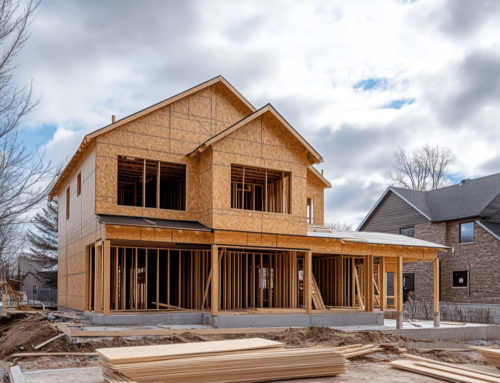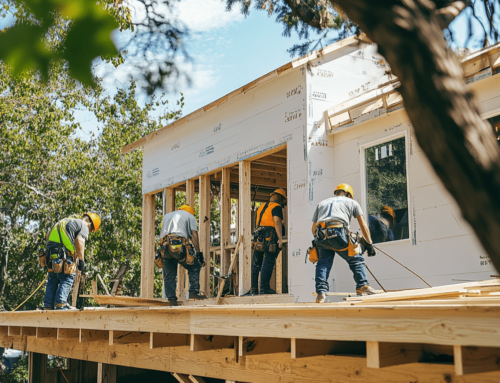If your home has suffered damages covered under your homeowners insurance policy, you’ll need to find a contractor to do the work. You are likely to come across some professionals who specialize in these types of jobs known as insurance restoration contractors. These contractors are indeed a little different from general contractors in a few notable ways.
However, if you’re going to use your homeowners claim payment to get your house back in shape, it’s worth carefully considering your options. We created this guide to help you understand what an insurance restoration contractor is, how they’re different from general contractors, and whether or not they’re your best option.
What Is an Insurance Restoration Contractor?
Insurance restoration contractors are contractors whose business is primarily working with home insurers to restore damaged homes following a loss. Some may not even work on other types of jobs at all.
What Makes an Insurance Restoration Contractor Different From Other Contractors?
Specialist contractors who work with insurance companies have a different business model and function a little differently from other contractors. Some of the key ways they are distinct include:
- Service offerings: Insurance restoration contractors may only offer restoration services, and not other traditional contractor services like remodels or building additions.
- Relationships: Many of these contractors have well-developed relationships with insurance companies and a history of working together.
- Experience: Working with insurance companies requires a few extra steps and more paperwork than standard two-party contracts. Restoration contractors are often more experienced with this process and can therefore work through it more efficiently.
Insurer-Preferred Contractors
Following a claims approval, your insurer may present you with a list of preferred contractors. The companies on these lists often have existing relationships with the insurer. In many cases, they have previous experience working together.
Do You Have To Use a Contractor Recommended By Your Insurance?
Your insurer may recommend that you work with one of their preferred contractors. But this doesn’t mean you have to choose one. As the homeowner and the policyholder, it is your right to choose the contractor that does your restoration work.
Insurer-Preferred Contractor Pros and Cons
There are some good reasons to consider a contractor your insurer suggests. However, there are some downsides to consider as well. We’ve listed some of the main advantages and disadvantages in the table below.
| Insurance-Recommended Contractor Pros | Insurance-Recommended Contractor Cons |
| Streamlined, efficient process | Can have long wait times |
| Experience dealing with restoration work | May base their price on claim payout rather than actual cost of work |
| Can assist you with claims | Limited selection |
How Do Restoration Companies Work With Insurance?
There are a few ways in which an insurance rehabilitation contractor can work with your insurance provider. These are related to how the contractor gets paid from the claims settlement.
One way is to work with the homeowner directly, as a contractor would for any type of restoration or improvement project that doesn’t involve an insurer. In this situation, the company pays out the settlement to you, and you pay the contractor.
In some cases, a specialty contractor can take payment directly from the insurer, bypassing the homeowner. The contractor will negotiate the jobs that need doing and how much they charge for the work. Once the work is complete, the insurer pays the contractor and may issue you any remaining funds from the settlement.
Can You Hire Any Contractor For Insurance Repairs?
Technically, you can hire a general contractor to do insurance repair work. There is no legal requirement or policy requirement to use a contractor your insurance company recommends — or even a restoration specialist at all. In fact, you are legally entitled to choose any contractor that meets the requirements of your insurance provider.
Eligibility Requirements for Insurance Restoration Contractors
First and foremost, your insurer will almost certainly require any contractor working on your home to have a valid contractor license. However, this is also a requirement for any contractor working in North Carolina. This license is officially called a License to Practice General Contracting and issued by the North Carolina Licensing Board for General Contractors.
Contractor Insurance Requirements for Insurance Restorations
There is no blanket insurance requirement from the state for general contractors in North Carolina. However, some types of jobs do require liability and/or workers compensation insurance.
Your homeowners insurance provider may require certain amounts of coverage in order to approve a work proposal. This is to ensure compensation is provided if the contractor makes any mistakes that lead to more damage to your home.

Should You Use an Insurance Restoration Contractor?
The decision of whether to use an insurance restoration specialty contractor or not depends on the companies involved and your preferences when handling claims. That’s why we suggest taking the time to find a few options and compare before committing to one contractor or another.
How To Choose a Restoration Contractor
We’ve created a process guide to assist you in finding your best option for restoring your home after a covered loss. Following these steps can help you get the best deal and avoid an unfavorable situation.
- Get a damage assessment: As part of the claims process, your insurer will create an itemized list of damages covered under your policy. Get a copy of this list so you can get accurate estimates for comparison.
- Get the list of recommended contractors: An insurance restoration contractor your insurer recommends may not be the option you choose, but it’s always worth considering. You won’t know what they can offer until you talk to them.
- Find general contractors to compare: You should also look for a few trustworthy general contractors who can do the work required to rehabilitate your home. Use a search engine to find highly-rated contractors in your area, or ask around for recommendations.
- Get estimates: Submit the list of all the work needed on your home to a few contractors, pulling from both the list of preferred insurers from your provider and ones you found and ask for estimates. Some of them will want to inspect the damage in person. This can make the estimate process time-consuming, but the potential cost difference between contractors will almost certainly make it worth the effort.
- Compare offers: Once you have estimates in hand, compare the ones you received. Price is obviously the main point of comparison, but there are other things you should consider, too. Your estimates should include a projected timeline for repairs. You’ll also want to compare the reputations of each company, which you can assess through online reviews on Google and sites like the Better Business Bureau (BBB).
- Choose your contractor: When you’ve identified a contractor that offers the combination of price, timing, and reputation that suits you best, reach out to make it official. Whether they are recommended by your insurance provider or a company you found on your own, they’ll need to work with your insurer from this point on.
Your Home, Your Choice of Contractor
Ultimately, the decision of who does the work of restoring your home is yours. Going with a preferred contractor can be a more seamless, hands-off process. But shopping for your own contractor can help you see if that’s actually your best option.
The ideal contractor is one who has the experience and knowledge to work well with your insurer, but isn’t tied to them in any way. You want a contractor that looks out for your needs, not their own or your insurance provider’s. Taking the time to shop around and carefully consider your options can help you find them.





